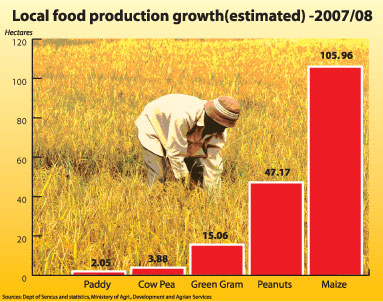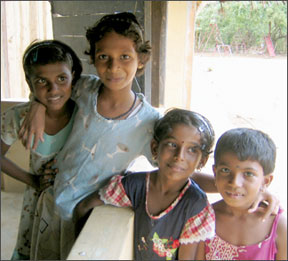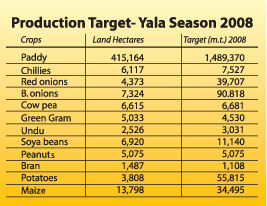For a greener tomorrow
Api wawamu - Rata nagamu
by Dhaneshi Yatawara
[email protected]
We, Sri Lankans were born and brought up in a culture where
agriculture plays a major role. Our culture is nourished with hundreds
of customs and beliefs which are rooted in our green paddy fields and
chenas, kept moist by waters of our massive tanks and irrigation
systems, treasured and cared by our farmers. For our ancestors
nourishing the nation was conspicuous.
The white shadows
We have never begged for our food. We were a self sufficient nation,
where every house, every village had enough food stocks in their barns
making the nation the granary of the East. White shadows that started to
ghost our motherland totally demolished our self-sufficient economy.
We were under colonial rule for nearly four centuries. It totally
destroyed our economy, agriculture and all the deep rooted values and
customs making us more and more weak and vulnerable. The self sufficient
village was lost in front of the plantation economy. Eventually this
island nation that was totally independent, had to become totally
dependent.
Fortunately or unfortunately, though many regimes which came to power
after independence since 1948 tried to implement programmes to restart
and upgrade local food production, failed due to many reasons. Does this
mean we should be a failing nation continuously and live just hailing
our glorious history? It should end for the sake of our successors, the
future generation.
Therefore, isn't it high time for us to start thinking rebuilding
ourselves and our nation - on every aspect with the strength we
inherited from our predecessors?
Undoubtedly, food is one of the basic needs of a human being. It
faced its natural changes at the turns and bends of our cultural and
social evolution.
 Feeding a nation could be the greatest undertaking a country has to
face amidst the highly ascending population growth. Comparatively land,
water, climate would not rise. There could be a technical drawback. Due
to these reasons agriculture sector is faced with a never ending
challenge and uncertainty. This is universal. Sri Lanka faces the same
scenario though we have a strong agricultural background. Feeding a nation could be the greatest undertaking a country has to
face amidst the highly ascending population growth. Comparatively land,
water, climate would not rise. There could be a technical drawback. Due
to these reasons agriculture sector is faced with a never ending
challenge and uncertainty. This is universal. Sri Lanka faces the same
scenario though we have a strong agricultural background.
The Government in particular, faces a challenge in sorting out these
complicated issues. If not addressed satisfactorily food shortage can
draw the country back drastically. Due to the high price increase of
food in the world market importing substitutes for existing local food
can be unbearable.
According to statistics available the agricultural contribution to
the 2006 national gross production was approximately 16.8%. It is highly
essential to upgrade this status. As a country our strength is
agriculture. We have spent approximately 49 million rupees to import
fruits, grains etc. Totally we spend 100 billion rupees to import food
items - a 23% of the total food demand. Does this mean to say we have no
hope? No way out? Well this is not so gloomy.
 We are people of a strong nation. We have a solid and steady history
- a great source for experiences of a nation. Nearly 32% of the total
population is engaged in agriculture. Yet in 2006 the agricultural
contribution to the Gross Domestic Product was 16.8%, including the
plantation sector, fisheries and forestry. We are people of a strong nation. We have a solid and steady history
- a great source for experiences of a nation. Nearly 32% of the total
population is engaged in agriculture. Yet in 2006 the agricultural
contribution to the Gross Domestic Product was 16.8%, including the
plantation sector, fisheries and forestry.
According to the statistics, 70 % of the rural population is engaged
in agriculture, directly or indirectly. Yet, 25% - 30% of this facing
poverty. In 2006 we have spent 49 billion rupees just to import food
items like fruits other than dairy products, fish and sugar.
Yet there is another side to this story. According to agricultural
census calculated in year 2002, 1.56 million hectares of arable land is
divided among 3.25 million farmers.
This includes 382,300 farmers only with a garden and another 559,241
farmers with a plot of land(s) in addition to a garden. There are
700,361 farmers who owns a plot of land(s), according to the statistics
gathered. More than 90% of these farmers are capable of cultivating and
producing food even in small amounts.
Hence, do we need to entirely depend upon imported food and then put
ourselves at risk? By increasing the production of local food items we
can lower the high expenditure that goes to import food. It will check
the flow of foreign exchange out of the country.
Hence, the Government implemented 'the programme promoting local food
production'. This is 'Api Wawamu - Rata Nagamu' - let's grow and build
the nation. This programmes is a three year programme starting from year
2007.
Api Wawamu - Rata Nagamu
 The programme focuses on: The programme focuses on:
* Increasing the production of essential food crops,
* Increase the agricultural contribution to the gross production of
the country,
* Secure the food and nutrition safety of people
* Decreasing the expenditure of importing food
* Build-up the income of the farmer community
* Expand suitable new technology
* And preserve the environment friendly traditional agriculture
methods etc.
Sri Lankan traditional agriculture system focuses on the paddy field,
chena and the home garden. These can be properly used to answer the
problems such as high living cost, malnutrition and several other
related issues. The home garden concept is quite effective to countries
like Sri Lanka. It definitely has an impact on nutrition level of a
family as well.
The Agriculture Development and Agrarian Services Ministry have
already set up 1,756 home gardens with in Colombo, 11,933 in Kandy,
20,795 in Matara, 31,997 in Kurunegala. In Nuwara Eliya there are 10,498
home gardens and another 15,092 in Anuradhapura. These are just the
significant numbers the Ministry has achieved so far since the
initiation of Api Wawamu - Rata Nagamu project. Improving home gardens
is wide spread throughout the country. It takes place almost in every
main city.
Though Sri Lanka seems to be self sufficient in rice production wheat
flour consumption per person was 40kg per annum. Yet, now we have been
able to cut down almost 50% of wheat flour importation this year. On the
other hand we have been importing corn in huge quantities just as animal
feed. The Ministry is now focusing on gradually increasing the local
corn production and totally cut down the importation.
Under the programme schools, military establishments, offices and any
arable land are used to cultivate. The Ministry is in full gear
promoting the local production at all the levels. We as citizens of this
country need to focus more on promoting local production, may be not in
large scale but to our level best.
This would definitely give a great boost to the economy as well as to
the total social structure - above all this would be the first step in
making our future generation to be in a proud and prosperous nation.
This is our duty for our land.
|
